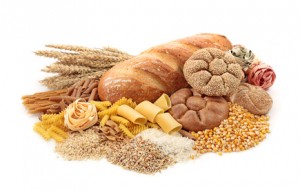This week, read a great review of the book Grain Brain, how vitamins C and E can hurt endurance performance, how food size can affect calorie intake, how exercising can lead to younger looking skin, and how Monday’s are a popular day to look for health information.
 Wondering if grains are bad for your brain? Wonder no more. Dietitian Diana Chard does a nice job dissecting the popular diet book “Grain Brain” which joins “Wheat Belly” in claiming grains are causing almost all that ails us. As I mention in my review of questionable diets, there is no good evidence that wheat causes disease or weight gain, but actually very good evidence that WHOLE grains are health promoting. Some of the claims in these books are borderline ridiculous (Grain Brain links grains to various conditions including depression, autism, tourette’s, and ADHD, while Wheat Belly links wheat to just about any ailment you can imagine).
Wondering if grains are bad for your brain? Wonder no more. Dietitian Diana Chard does a nice job dissecting the popular diet book “Grain Brain” which joins “Wheat Belly” in claiming grains are causing almost all that ails us. As I mention in my review of questionable diets, there is no good evidence that wheat causes disease or weight gain, but actually very good evidence that WHOLE grains are health promoting. Some of the claims in these books are borderline ridiculous (Grain Brain links grains to various conditions including depression, autism, tourette’s, and ADHD, while Wheat Belly links wheat to just about any ailment you can imagine).
Get your vitamins /antioxidants from food, not supplements. This week yet another study added to the growing body of evidence showing that we shouldn’t be relying on vitamins and supplements to improve our health or athletic performance. Norwegian researchers used a rigorous study design (double blind randomized controlled trial) to investigate the effects of Vitamins C & E on endurance training in healthy men and women. They found that vitamin C and E supplements blunted cellular processes that improve muscular endurance (increase of mitochondrial proteins-COX4. (J Physiol, 592, 1887-1901).
Smaller food pieces could make you increase portions and calories. Researcher Barbara Rolls of Penn State University is an expert in how different properties of food (e.g., calorie density, fat content, portion size) affect how much people eat. In this study, she found that people served themselves larger portions of cereal when the flakes were crushed to a smaller size. (J Acad Nutr Diet. 2014 ). I’ve written more about how cues that aren’t related to hunger influence our eating habits here.
In case you need more motivation to exercise, it might keep your skin younger looking! Researchers at McMaster University have been conducting a series of studies on how exercise affects skin. Studies in mice showed that exercising mice retained young looking fur (that never turned gray) compared to their sedentary counterparts. To investigate this protective effect in humans, they compared the skin of regular exercisers to sedentary men and women, and found that exercisers over 40 had skin similar to 20- to- 30-year olds. To rule out lifestyle factors like diet, they conducted another study where they randomly assigned 65+ year-olds to an exercise group or a sedentary group. After 3 months, the skin of the exercising group looked much younger.
Of course, it is well-established that sun exposure ages skin (researchers were examining buttock skin). So if you’re looking for the protective effects of exercise, don’t forget your hat or sunscreen if you’re heading outside!
Looking for health . . . on a Monday. New Year’s Day is a popular time for individuals to make health resolutions, but a new study lends support to earlier research showing that many people seek to make health changes on Mondays. Researchers from San Diego State University, Santa Fe Institute, and Johns Hopkins monitored health-related Google Searches for 8 years (2004-2012), and found that the beginning of the week was the most popular for Google health searches. Health promotion experts have recognized the opportunity in Mondays with The Monday Campaigns. (American Journal of Preventive Medicine).
Share This: